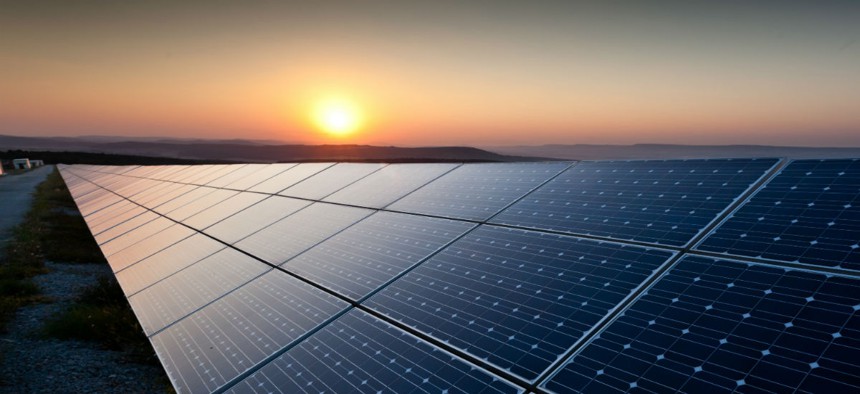
Gencho Petkov / Shutterstock.com
White House, Pelosi Sell Omnibus as a Climate Win, Despite Oil Concession
The Obama administration contends extending green-energy tax credits overwhelms any pollution increase from allowing crude-oil exports.
The White House and House Minority Leader Nancy Pelosi are seeking to defuse charges that the year-end spending agreement with Capitol Hill Republicans is a raw deal for the planet.
The effort arrives a day before House and Senate votes on the omnibus package, which includes a major win for the oil industry and Republicans: removing the 40-year-old ban on U.S. crude-oil exports.
A number of Democrats and environmental activists are balking at the provision.
Pelosi supports the overall bill, but told reporters Thursday that the oil measure is “probably the biggest obstacle I have to overcome to support what is before us today and tomorrow.”
Later in the day, with Friday’s vote drawing closer, she sent a letter to Democratic lawmakers making the case that green-energy provisions more than offset the oil language that she detests.
“While lifting the oil export ban remains atrocious policy, the wind and solar tax credits in the Omnibus will eliminate around ten times more carbon pollution than the exports of oil will add,” Pelosi wrote.
The White House also says there’s a lot more good than bad on the climate-change front, despite its opposition to provisions that require the ban to be lifted. Dan Utech, a senior climate adviser to President Obama, used the White House blog Thursday to make the case for the bill.
Utech wrote in a blog post that the five-year extensions of tax incentives for wind and solar-power projects—the production tax credit (PTC) and the investment tax credit (ITC)—will help cut carbon emissions far more than any potential pollution bump from opening the taps to crude exports.
He called it one of the biggest investments in renewable-energy deployment in the nation’s history (and indeed the Joint Committee on Taxation tallies the wind provision’s cost at roughly $14.5 billion over 10 years, and the solar piece costs billions of dollars too).
“In fact, preliminary [National Renewable Energy Laboratory] analysis indicates that an extension of the PTC and ITC through 2020—a rough proxy for the bill in front of Congress—would help spur the construction of enough wind and solar to power 30 million homes in 2020,” he wrote. That would cut carbon emissions by more than 200 million metric tons in 2020, Utech said.
Utech then cited analysis from the federal Energy Information Administration about the effect on U.S. oil production of lifting the ban to conclude that, from a climate standpoint, the effect on emissions is likely to be “minimal.”
“EIA’s core case—the one considered most likely—projects that removing the ban has no impact on production or exports and thus no impact on greenhouse gas emissions between now and 2025. So our expert agency’s best estimates indicate the greenhouse gas impacts of removing the crude oil ban is negligible,” he said.
Utech is not alone.
Michael Levi, an analyst with the Council on Foreign Relations, posted an analysis this week concluding that any increase in emissions from lifting the export ban is very small compared to the benefits of other White House policies: a big increase in auto-mileage standards and sweeping Environmental Protection Agency rules to force cuts in power-plant emissions.
But claims of a largely benign climate impact from lifting the export ban are not going unchallenged.
The environmental group Oil Change International is vigorously making the case that allowing crude-oil exports—which under some estimates could eventually boost U.S. production by up to a half-million barrels daily—will enable major carbon emissions.
The group warns against dismissing the impact of policies that push more fossil-fuel supplies onto the market. More broadly, environmentalists argue that climate policy must do more to choke off fossil-fuel extraction (a common rallying cry is “keep it in the ground”) in addition to measures that cut demand and help burn fuel more cleanly.
“Professional sceptics continue to doubt the importance to climate change of fossil fuel supply. In reality, the climate problem is caused by the quantity of fossil fuels, which can be addressed at either end of the supply chain, as the same amount is consumed as is extracted,” wrote Greg Muttitt, a senior campaign adviser with Oil Change International, in an analysis this week.
Oil industry leaders have been pushing for removal of heavy export restrictions that were imposed after the Arab oil embargo in the 1970s.
They’re eager to eventually take advantage of higher prices that have often been available on world markets, although right now the difference is slight, and with crude prices low there may be little short-term effect from ending the restrictions.
Industry officials argue that lifting the ban would be an overall boost for the U.S. economy and create large numbers of jobs by stimulating more spending on domestic production projects and related industries.
The timing of the deal, just days after the Paris climate agreement was struck, rankles environmentalists—and Pelosi, despite her sales pitch.
“The timing of it is so incredible—that right when the rest of the world is saying, ‘We are going to reduce our dependence on fossil fuels, we are going to reduce emissions,’ we are taking an action that is going to increase emissions,” Pelosi said at her press conference Thursday morning.
(Image via Gencho Petkov / Shutterstock.com)







